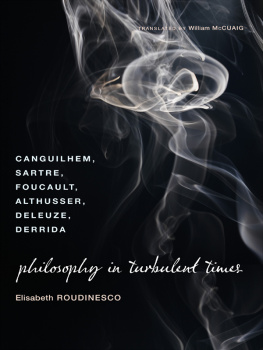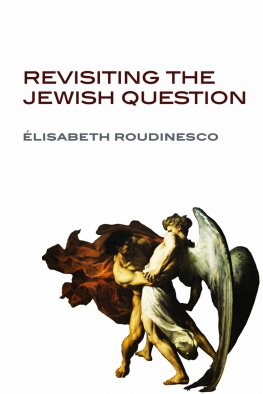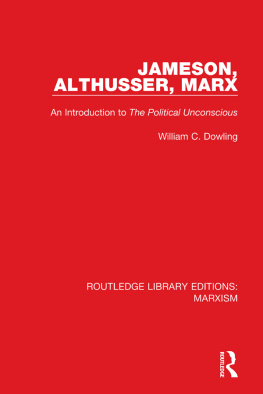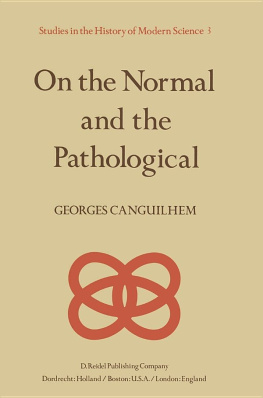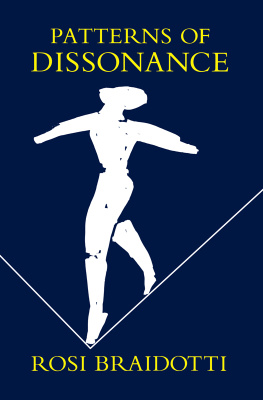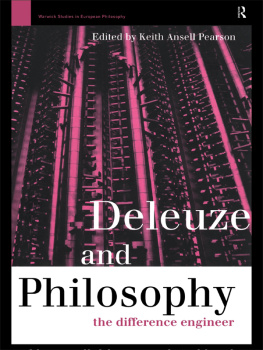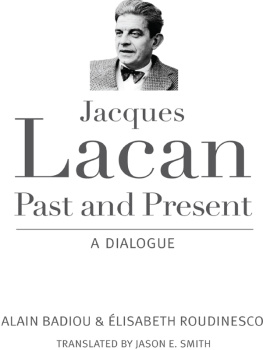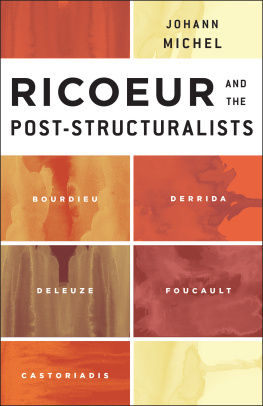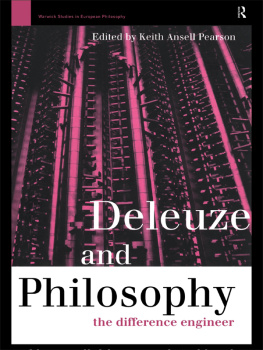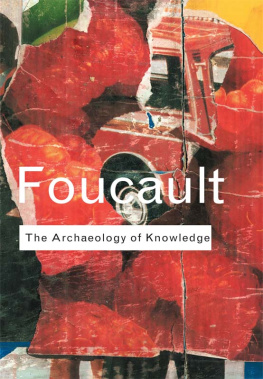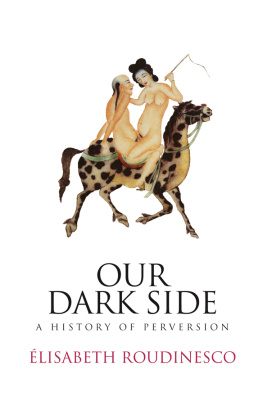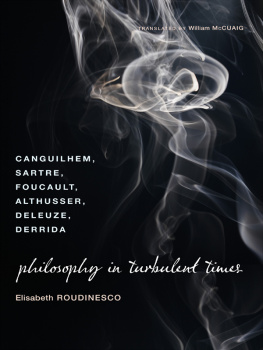PHILOSOPHY IN TURBULENT TIMES
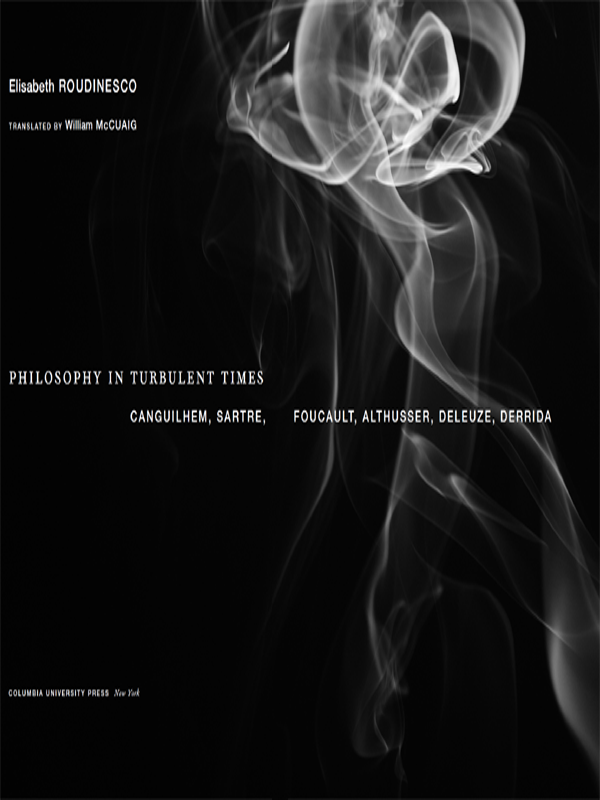
Columbia University Press
Publishers Since 1893
New York Chichester, West Sussex
cup.columbia.edu
Copyright 2005 Librarie Arthme Fayard
Copyright 2008 Columbia University Press
Paperback edition, 2010
All rights reserved
E-ISBN 978-0-231-51885-7
Library of Congress Cataloging-in-Publication
Roudinesco, Elisabeth, 1944
[Philosophes dans la tourmente. English]
Philosophy in turbulent times: Canguilhem, Sartre, Foucault, Althusser, Deleuze, Derrida / Elisabeth Roudinesco; translated by William McCuaig.
p. cm.
Includes bibliographical references (p.).
ISBN 978-0-231-14300-4 (cloth: alk. paper)ISBN 978-0-231-14301-1 (pbk. : alk. paper)ISBN 978-0-231-51885-7 (e-book)
1. PhilosophyFranceHistory20th century. 2. Philosophy, French20th century. 3. PhilosophersFranceHistory20th century. I. Title.
B2421.R6813 2008
194dc22
2008021953
A Columbia University Press E-book.
CUP would be pleased to hear about your reading experience with this e-book at .
References to Internet Web sites (URLs) were accurate at the time of writing. Neither the author nor Columbia University Press is responsible for URLs that may have expired or changed since the manuscript was prepared.
To Christian Jambet
CONTENTS
W E ARE CERTAINLY LIVING IN STRANGE TIMES . The commemoration of great events, great men, great intellectual achievements, and great virtues never stops; weve had the year of Rimbaud, the year of Victor Hugo, the year of Jules Verne. And yet, never have revisionist attacks on the foundations of every discipline, every doctrine, every emancipatory adventure enjoyed such prestige. Feminism, socialism, and psychoanalysis are violently rejected, and Freud, Marx, and Nietzsche are pronounced dead, along with every kind of critique of the norm. All we are entitled to do, it would seem, is to take stock and draw up assessments, as though the distance that every intellectual enterprise requires amounted to no more than a vast ledger full of entries for things and peopleor rather people who have become things.
I am not thinking just of Holocaust denial, which has been outlawed among professional historians, although its influence persists in semi-secrecy. Instead what I have in mind are those ordinary little revisionisms that tend, for example, to put Vichy and the Resistance on the same footing, because of the necessity to relativize heroism, and the drive to oppugn the idea of rebellion. Another example is the clever reinterpretation of textual evidence to make Salvador Allende into a racist, an anti-Semite, and a eugenicist, for the purpose of denigrating the putative founding myths of socialism around the world.
As for philosophy, while its place in the educational curriculum of the schools and universities is threatened by all those who judge it useless, outmoded, too Greek or too German, and impossible to put a price on or fit into a scientistic pigeonhole (in sum, too subversive), the drive to philosophize or learn to think for oneself is expanding outside the institutions of the state, embracing Plato, Socrates, the pre-Socratic materialists, the Latins, the moderns, the postmoderns, the old and new moderns, the new or old reactionaries. There is a gap between the academicism that is returning in force to official schooling and the massive demand for living teaching outside the universities, and this gap continues to grow wider in a world haunted by fear of the loss of identity, boundaries, and national particularism.
Feature stories in our periodicals and newspapers almost all convey a catastrophic outlook: the end of history, the end of ideology, the end of towering individuals, the end of thought, the end of mankind, the end of everything. Jean-Paul Sartrefor or against? Raymond Aronfor or against? Would it suit you better to be in the right with the former as against the latter, or vice versa? Should we take a blowtorch to May 1968 and its ideas, its thinkers, and their writings, seen now as incomprehensible, elitist, dangerous, and antidemocratic? Have the protagonists of that revolution in behavior and mentality all become little bourgeois capitalist pleasure seekers without faith or principles, or havent they?
Everywhere the same questions, and everywhere the same answers, all claiming to bear witness to a new malaise of civilization. The father has vanished, but why not the mother? Isnt the mother really just a father, in the end, and the father a mother? Why do young people not think anything? Why are children so unbearable? Is it because of Franoise Dolto, or television, or pornography, or comic books? And leading thinkerswhat has become of them? Are they dead, or gestating, or hibernating? Or are they on the road to extinction?
And women: are they capable of supervising male workers on the same basis as men are? Of thinking like men, of being philosophers? Do they have the same brain, the same neurons, the same emotions, the same criminal instincts? Was Christ the lover of Mary Magdalene, and if so, does that mean that the Christian religion is sexually split between a hidden feminine pole and a dominant masculine one?
Has France become decadent? Are you for Spinoza, Darwin, Galileo, or against? Are you partial to the United States? Wasnt Heidegger a Nazi? Was Michel Foucault the precursor of Bin Laden, Gilles Deleuze a drug addict, Jacques Derrida a deconstructed guru? Was Napoleon really so different from Hitler? State the similarities, proffer your thoughts, assess your knowledge, speak for yourself.
Whom do you prefer; who are the puniest figures, the greatest ones, the most mediocre, the biggest charlatans, the most criminal? Classify, rank, calculate, measure, put a price on, normalize: this is the absolute nadir of contemporary interrogation, endlessly imposing itself in the name of a bogus modernity that undermines every form of critical intelligence grounded in the analysis of the complexity of things and persons.
Never has sexuality been so untrammeled, and never has science progressed so far in the exploration of the body and the brain. Yet never has psychological suffering been more intense: solitude, use of mind-altering drugs, boredom, fatigue, dieting, obesity, the medicalization of every second of existence. The freedom of the self, so necessary, and won at the cost of so much struggle during the twentieth century, seems to have turned back into a demand for puritanical restraint. As for social suffering, it is increasingly harder to bear because it seems to be constantly on the rise, against a background of youth unemployment and tragic factory closings.
Set free from the shackles of morality, sex is experienced not as the correlate of desire, but as performance, as gymnastics, as hygiene for the organs that can only lead to deathly lassitude. How does one climax, and bring ones partner to climax. What is the ideal size of the vagina, the correct length of the penis? How often? How many partners in a lifetime, in a week, in a single day, minute by minute? Never has the psychology of conditioning, of sexological or partner-swapping alienation been so overpowering as it is today. So much so that by now we are seeing a surge in complaints of every kind. The more individuals are promised happiness and the ideal of security, the more their unhappiness persists, the steeper the risk profile grows, and the more the victims of unkept promises revolt against those who have betrayed them.

